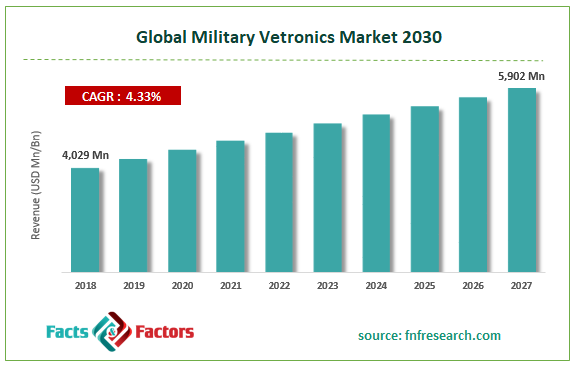Search Market Research Report
Military Vetronics Market Size, Share Global Analysis Report, 2018 – 2027

Military Vetronics Market By Product (Communication System, Power System, Navigation System, Control & Data Distribution System, C4 System, and Display System) and By Application (Light Protected Vehicles, Special Purpose Vehicles, Unmanned Ground Vehicles, and Armored Amphibious Vehicles): Global Industry Perspective, Comprehensive Analysis, and Forecast 2018 – 2027
Industry Insights
The report covers the forecast and analysis of the Military Vetronics market on a global and regional level. The study provides historical data from 2015 to 2018 along with a forecast from 2019 to 2027 based on revenue (USD Million). The study includes drivers and restraints of the Military Vetronics market along with the impact they have on the demand over the forecast period. Additionally, the report includes the study of opportunities available in the Military Vetronics market on a global level.

In order to give the users of this report a comprehensive view of the Military Vetronics market, we have included a competitive landscape and an analysis of Porter’s Five Forces model for the market. The study encompasses a market attractiveness analysis, wherein all the segments are benchmarked based on their market size, growth rate, and general attractiveness.
The report provides company market share analysis to give a broader overview of the key players in the market. In addition, the report also covers key strategic developments of the market including acquisitions & mergers, new products & service launches, agreements, partnerships, collaborations & joint ventures, research & development, and regional expansion of major participants involved in the market on a global and regional basis.
The study provides a decisive view of the Military Vetronics market by segmenting the market based on product, application, and regions. All the segments have been analyzed based on present and future trends and the market is estimated from 2019 to 2027. The regional segmentation includes the current and forecast demand for North America, Europe, Asia Pacific, Latin America, and the Middle East and Africa.
Rapid technological breakthroughs witnessed in the military Vetronics such as high bandwidth networking facility, HD video calling, and new threat detecting sensors are predicted to favorably impact the surge in the growth of the business over the forecast timeline. Nonetheless, the lowering of fund allocation for defense activities will dampen the business growth over the forecast timeline. However, the addition of new features to military Vetronics will offer new growth avenues for the market during the forecast timespan and thus negate the adverse effect of the hindrances on the market expansion.
 Report Scope
Report Scope
Report Attribute |
Details |
Market Size in 2018 |
USD 4,029 million |
Projected Market Size in 2027 |
USD 5,902 million |
Growth Rate |
CAGR 4.33% |
Base Year |
2018 |
Forecast Years |
2019-2027 |
Key Market Players |
Lockheed Martin Corporation, Ultra Electronics Ltd., Elbit Systems Ltd., Kongsberg Gruppen ASA, The Curtiss-Wright Corporation, General Electric Company, The Raytheon Company, BAE Systems PLC, General Dynamics Corporation, SAAB A.B., and Thales Group. |
Key Segment |
By Product, By Application |
Major Regions Covered |
North America, Europe, Asia Pacific, Latin America, and the Middle East & Africa |
Purchase Options |
Request customized purchase options to meet your research needs. Explore purchase options |
Based on the product, the market is sectored into Communication System, Power System, Navigation System, Control & Data Distribution System, C4 System, and Display System. Application-wise, the industry is classified into Light Protected Vehicles, Special Purpose Vehicles, Unmanned Ground Vehicles, and Armored Amphibious Vehicles.
 Some of the major players in the business include
Some of the major players in the business include
- Lockheed Martin Corporation
- Ultra Electronics Ltd.
- Elbit Systems Ltd.
- Kongsberg Gruppen ASA
- The Curtiss-Wright Corporation
- General Electric Company
- The Raytheon Company
- BAE Systems PLC
- General Dynamics Corporation
- SAAB A.B.
- Thales Group.
Industry Major Market Players
- Lockheed Martin Corporation
- Ultra Electronics Ltd.
- Elbit Systems Ltd.
- Kongsberg Gruppen ASA
Frequently Asked Questions

Copyright © 2024 - 2025, All Rights Reserved, Facts and Factors


